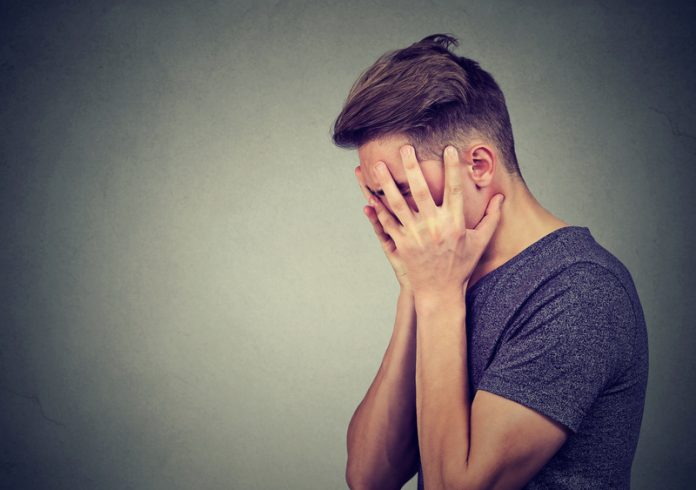Research reveals that 70% of young men with anxiety report that their work performance and relationships are affected, yet well over half of them are still not seeking help
Anxiety is one of the most prevalent mental health conditions in the UK, with one in five people reporting that they feel anxious a lot or all of the time,[i] seriously affecting work productivity.
More than 45 million working days have been lost due to anxiety combined with depression and stress in the past three years, including a 25% increase over the past year alone, costing the British economy an average of £2.4 billion[ii] a year.
According to a new survey[iii] among 500 male anxiety sufferers, commissioned by Kalms Lavender, young men in their twenties and thirties, at a crucial stage in their careers, are most affected by the crippling impact of anxiety.
As many as 70% of men surveyed say their anxiety has an impact on their work and relationships and 80% found it also affects their social life, with over half revealing it also impacted their sex life.
Anxiety UK CEO Nicky Lidbetter highlights: “Anxiety is extremely common and at its worst can be incredibly disabling. It is important therefore that those living with anxiety seek early help and that treatment interventions offered are acceptable and accessible.”
Obtaining help and support, however, can be especially difficult for those experiencing anxiety, with two-thirds of the young men surveyed reporting that men find it harder to talk about anxiety than women and over a third choose to avoid difficult situations as a way of dealing with their anxiety.
A potential contributor for this could be common perceptions of masculinity[iv], making it hard for men to accept and talk about their feelings. In fact, as many as 44% of male sufferers in their early twenties revealed they had suffered from anxiety for up to 5 years, and nearly 70% of them hadn’t even discussed it with their partner.
Interestingly, in 65% of men surveyed in their mid-twenties to mid-thirties, their work was the cause of their anxiety but perhaps even more worrying was that over half reported that their anxiety was caused by their friends and relationships.
Digital Marketing Manager Jay Wicks (29 from Cornwall), knows all too well how hard it is to seek help and treatment for anxiety. He commented: “I’ve suffered from anxiety for 15 years. At its peak, I found myself avoiding going outside for days, not contacting or responding to family or friends, lying in bed all day feeling physically sick with shakes and a pounding heart. Initially, my anxiety stemmed from the loss of my parents as a teenager, but now social occasions and pressures at work all exacerbate my anxiety.
“I would absolutely say that men find it harder to talk about anxiety than women, and would put it down in part to toxic masculinity… it has become a social norm that stretches far beyond talking about anxiety and encompasses almost everything to do with male mental health.
“Looking back, I’d definitely say that previous relationships also triggered my anxiety. In contrast, my current relationship is so stable, luckily my partner recognises my symptoms, encourages me to talk and gives me so much strength.”
Concerning the debilitating symptoms of anxiety, over two-thirds (62%) of men in their late twenties surveyed reported experienced feelings of dread, with as many as 75% suffering from decreased motivation and irritability and half of the respondents reported actually feeling physically tired and nauseous.
These feelings occur due to an ‘imbalance’ in the way the body processes environmental and sensory stimuli. A disproportionate ‘excitatory’ response, and excessive release of neurotransmitters between nerve cells in the brain, leads to overstimulation of the nervous system and feelings of anxiety.
Now, research suggests that pharmaceutical quality lavender oil can reduce excessive neurotransmitter activity, thus reducing overstimulation and hyperactivity of the nervous response, and improving symptoms of anxiety.
Extensive clinical trials show that a daily capsule of this uniquely prepared, pharmaceutical quality lavender oil was found to be as effective as commonly used anti-anxiety medication, including the benzodiazepine lorazepam and selective serotonin reuptake inhibitor (SSRI) paroxetine prescribed in generalized anxiety disorder (GAD).[v],[vi]
Dr Siegfried Kasper, Professor of Psychiatry at the Medical University of Vienna, who was involved in a number of the clinical trials comments: “This is a very exciting development for anxiety as the research demonstrates the lavender oil capsules not only reduce both physical and psychological symptoms of anxiety but also have a beneficial effect on health-related quality of life, without problems such as sedation, addiction or interaction with other medications. When taken orally, the uniquely prepared, pharmaceutical quality lavender oil is able to cross the blood-brain barrier to dramatically reduce anxiety symptoms by nearly 60%[vii] with benefits evident after just two weeks.”
References
- [i] Mental Health Foundation, Living With Anxiety Report (2014)
- [ii] Office for National Statistics Labour Force Survey (2016)
- [iii] Male Anxiety Survey, carried out by Censuswide, December 2017 with 500 men experiencing anxiety. Commissioned by LanesHealth
- [iv] Mahalik et al, Social Science and Medicine, Masculinity and perceived normative health behaviours as predictors of men’s health behaviours (2007)
- [v] Kasper et al, Lavender oil preparation Silexan is effective in generalized anxiety disorder – a randomized, double-blind comparison to placebo and paroxetine. International Journal of Neuropsychopharmacology, Page 1 of 11. © CINP 2014 doi:10.1017/S1461145714000017
- [vi] H. Woelk a, S. Schlafke. A multi-center, double-blind, randomised study of the Lavender oil preparation Silexan in comparison to Lorazepam for generalized anxiety disorder. Phytomedicine 17 (2010) 94–99 doi:10.1016/j.phymed.2009.10.006
- [vii] Kasper S, et al. Silexan, an orally administered Lavandula oil preparation, is effective in the treatment of ‘subsyndromal’ anxiety disorder: a randomized, double-blind, placebo controlled trial. Int Clin Psychopharmacol 25:277–287 _c 2010 Wolters Kluwer Health | Lippincott Williams & Wilkins.DOI: 10.1097/YIC.0b013e32833b3242











